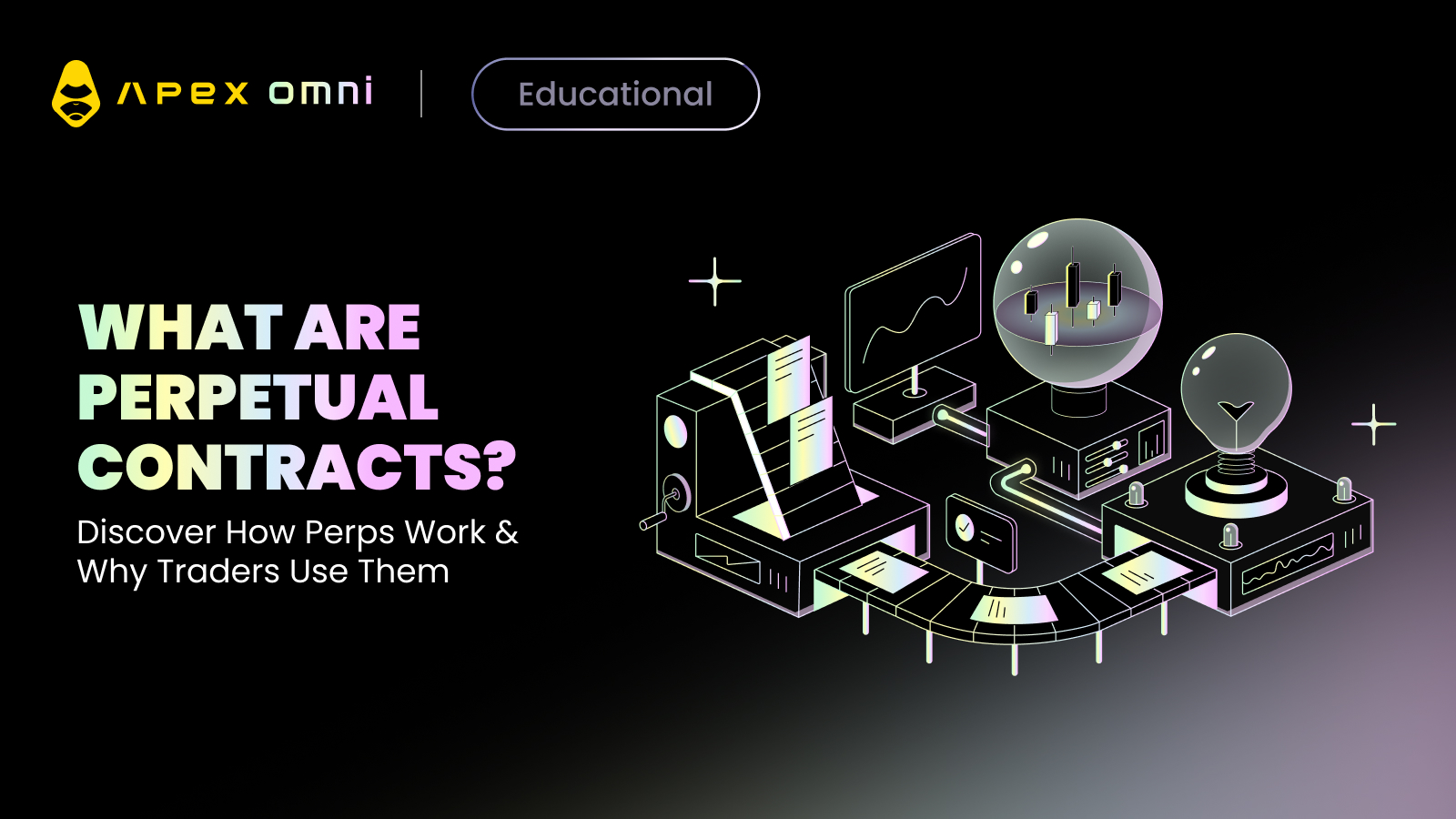What Are Perpetual Contracts? Your Guide to Perpetual Futures Trading
If you are someone who has been exploring crypto trading, you've most likely encountered the term "perpetual contracts" or "perps." These are the financial tools that have redefined how traders participate in crypto markets, creating more flexibility and opportunities in comparison with traditional futures.
Nowadays, Perps represent the backbone of crypto trading, attracting professional traders with extensive experience as well as newcomers who are looking to increase their trading potential. But what makes them so special, and why are traders heading to both centralized and decentralized exchanges to trade perpetual markets?
The following guide will detail everything you need to know about perpetual futures and help you understand why crypto perps have become a significant trading instrument in today's crypto landscape.
What Are Perpetual Contracts?
Perpetual contracts are a type of derivative that allows traders to speculate on the future price of an asset, like Bitcoin, Ethereum or Solana, without ever actually owning it. Unlike standard futures contracts, perpetuals don't have a set expiry or settlement date.
Instead, perps remain open indefinitely, as long as the trader maintains the necessary margin (collateral). This allows for long or short positions to be held over any timeframe, from minutes to months.
Perpetual Futures Explained: How Do They Work?
At a glance, perpetual futures resemble traditional futures contracts, but the key difference is that they do not have an expiration date. Here's a closer look at mechanics:
(1) No Expiry
Unlike traditional futures, there's no need to roll over or close contracts before a pre-set expiry date. Perpetual market traders can hold positions as long as they want, given that they meet the margin requirements.
(2) Funding Rate Mechanism
To keep the contract price in line with the spot price of the asset, perpetual contracts use a funding rate. This is a recurring fee paid between long and short traders, typically every 8 hours.
If the perp trades above the spot price, longs pay shorts.
If the perp trades below the spot price, shorts pay longs.
The funding rate mechanism incentivizes price convergence between the perpetual contract and the underlying asset.
(3) Leverage
Perpetual contracts oftentimes offer high leverage, sometimes up to 100x. This means traders can open large positions with relatively small amounts of capital, amplifying both gains and risks.
Why Traders Use Perps
Perpetual contracts are popular in crypto markets for a couple of reasons:
(1) Volatility
Traders can profit from both rising and falling markets by going long or short.
(2) Leverage
Small market movements can lead to significant gains—though losses are magnified too.
(3) Hedging
Perps provide a way to hedge spot holdings or reduce portfolio volatility.
(4) 24/7 Crypto Markets
Crypto never sleeps, and perps are designed to match that rhythm—available around the clock with constant liquidity.
DEX Perps: The Rise of Decentralized Perpetual Trading
While perpetual contracts started on centralized exchanges like Binance and Bybit, DEX perps are becoming increasingly popular as traders seek more transparency and control.
What Are DEX Perps?
DEX perps are perpetual futures contracts traded on decentralized exchanges (DEXs). DEXs use smart contracts to facilitate trades and do not rely on centralized authorities. There are many advantages of trading perps on a DEX, such as:
Non-custodial trading: You keep control of your private keys.
Transparent execution: Trades are settled on-chain.
Reduced counterparty risk: There's no central entity to fail or mismanage funds.
Gas-free options: Some protocols (like ApeX) offer gasless trading, making DEX perps even more cost-effective.
Popular DEXs offering perpetual contracts include: dYdX, GMX, ApeX Protocol (ApeX Omni), Vertex Protocol, etc.
Key Differences: Perpetuals vs. Traditional Futures
Feature | Perpetual Contracts (Perps) | Traditional Futures |
Expiry Date | No | Yes (fixed dates) |
Settlement | Ongoing | On expiry |
Funding Rate | Yes | No |
Leverage | High | Varies |
Common in Crypto | Yes | Less so |
Risks to Consider
While perpetual trading offers flexibility and opportunity, it also comes with risk, such as:
Liquidation risk: High leverage can quickly lead to liquidation if the market moves against your position.
Funding costs: Paying funding fees over time can eat into profits.
Volatility: Crypto markets are highly volatile, making it essential to use stop-losses and risk management strategies.
Are Perpetual Contracts Right for You?
If you're looking to engage in active crypto trading, hedge your portfolio or speculate on market movements, perpetual contracts can be an essential tool.
As DEX perps mature and become more user-friendly, they're unlocking permissionless access to leveraged trading globally. However, it is important to understand mechanics well and always apply risk management tools.
Start Trading Crypto Perpetuals on ApeX Omni
ApeX Omni gives traders a seamless and powerful way to dive into the crypto perpetuals market. With advanced trading tools, deep liquidity, and gas-free trading, you can easily customize your perp strategies to match your goals and risk tolerance.
FAQ
Are perpetual contracts the same as futures? Not exactly. While both are derivatives, perpetual contracts don't have an expiry date and rely on funding rates to stay in line with spot prices.
Can I trade perps on a DEX? Yes! Platforms like ApeX, dYdX, and GMX offer DEX perps with decentralized infrastructure, competitive fees, and non-custodial trading.
Are perpetual contracts risky? Yes, especially when using leverage. Proper risk management is crucial.
Complete a Simple Quiz for 100 USDT
Did you check out the blog? 🎯 Now it’s time to put your knowledge to the test! Head over to our Galxe page, take a quick quiz, and stand a chance to win from the $100 prize pool per quest.
To claim your rewards, ensure you’re connected to ApeX Omni. If you haven’t already, simply connect your wallet — and you’re good to go!

